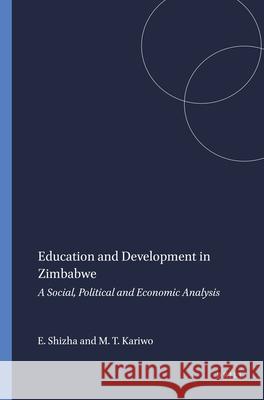Education and Development in Zimbabwe : A Social, Political and Economic Analysis » książka
Education and Development in Zimbabwe : A Social, Political and Economic Analysis
ISBN-13: 9789460916052 / Angielski / Twarda / 2011 / 229 str.
Education and Development in Zimbabwe : A Social, Political and Economic Analysis
ISBN-13: 9789460916052 / Angielski / Twarda / 2011 / 229 str.
(netto: 421,88 VAT: 5%)
Najniższa cena z 30 dni: 425,63
ok. 22 dni roboczych.
Darmowa dostawa!
The book represents a contribution to policy formulation and design in an increasingly knowledge economy in Zimbabwe. It challenges scholars to think about the role of education, its funding and the egalitarian approach to widening access to education. The nexus between education, democracy and policy change is a complex one. The book provides an illuminating account of the constantly evolving notions of national identity, language and citizenship from the Zimbabwean experience.The book discusses educational successes and challenges by examining the ideological effects of social, political and economic considerations on Zimbabwes colonial and postcolonial education. Currently, literature on current educational challenges in Zimbabwe is lacking and there is very little published material on these ideological effects on educational development in Zimbabwe. This book is likely to be one of the first on the impact of social, political and economic meltdown on education.The book is targeted at local and international academics and scholars of history of education and comparative education, scholars of international education and development, undergraduate and graduate students, and professors who are interested in educational development in Africa, particularly Zimbabwe. Notwithstanding, the book is a valuable resource to policy makers, educational administrators and researchers and the wider community. Shizha and Kariwos book is an important and illuminating addition on the effects of social, political and economic trajectories on education and development in Zimbabwe. It critically analyses the crucial specifics of the Zimbabwean situation by providing an in depth discourse on education at this historical juncture. The book offers new insights that may be useful for an understanding of not only the Zimbabwean case, but also education in other African countries.-Rosemary Gordon, Senior Lecturer in Educational Foundations, University of Zimbabwe).Ranging in temporal scope from the colonial era and its elitist legacy through the golden era of populist, universal elementary education to the disarray of contemporary socioeconomic crisis; covering elementary through higher education and touching thematically on everything from the pernicious effects of social adjustment programmes through the local deprofessionalization of teaching, this text provides a comprehensive, wide ranging and yet carefully detailed account of education in Zimbabwe. This engagingly written portrayal will prove illuminating not only to readers interested in Zimbabwes education specifically but more widely to all who are interested in how the sociopolitical shapes education- how ideology, policy, international pressures, economic factors and shifts in values collectively forge the historical and contemporary character of a countrys education.-Handel Kashope Wright, Professor of Education, University of British Columbia











